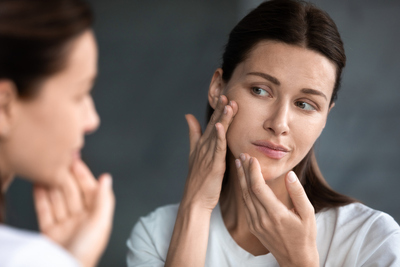The Impacts Acne Can Have on Depression

In honor of acne awareness month, we’re shedding light on a sensitive topic—can acne cause depression? The answer is yes. Read on to understand why acne sufferers are at risk of depression.
Psychological Effects of Acne
A new study published in the British Journal of Dermatology shows that people with acne are at a higher risk for developing depression. The study spanned 15 years and showed that the probability of developing depression was 18.5 percent among those with acne and 12 percent in those without. The study discovered a higher risk for depression occurred during the first five years after the acne diagnosis, with the risk being highest in the first year.
It is very common for acne sufferers to feel depressed. In a variety of studies, anywhere from 13-38% of acne patients—or as high as half of adolescent acne patients—report depression or meet criteria for other psychological disorders. Low self-esteem, anxiety, social stigmatization or isolation and feelings of helplessness and hopelessness—all symptoms of depression—can be side effects that accompany acne.
There is an increased correlation between depression and acne, but correlation does not indicate causation. A complicating factor is that the time that is most common for acne to strike, late adolescence and early adulthood, is also a very common time for psychological symptoms to emerge.
“Acne can have a very meaningful impact on health that goes beyond skin deep,” says Dr. Michele J. Farber of Schweiger Dermatology Group in NYC. “The results of a recent study published in the British Journal of Dermatology show that people with acne have a significantly higher risk of becoming depressed. Effectively treating acne not only results in clear skin, but also has the potential to improve mental health outcomes.”
It’s important for acne patients and their loved ones to be aware of this study and to be mindful for the increased chance of depression that can accompany acne.
To complicate matters even more, one of the most successful acne treatments around has been linked to depression. So, does Accutane® really lead to depression? There have been reports that link Accutane® (isotretinoin) with mood changes, depression and even suicide in patients.
While these symptoms must always be taken seriously by patients, families and doctors, it is a complicated clinical picture. Depression and its associated symptoms are related to acne in terms of a vicious cycle often involving low self-esteem, feelings of helplessness and hopelessness, a lack of control, anxiety and stigmatization or self-imposed isolation.
Complicating this is the likelihood of acne to strike during adolescence, a time of great emotional flux and insecurity as well as a high prevalence of psychological symptoms. It should be noted that no studies have been able to demonstrate Accutane® causing an increase in depression or suicidal behavior. For patients with a history of depression, it’s recommended to meet with a mental health professional prior to starting Accutane®.
Dealing with Acne Depression
Here are some tips to keep in mind to help make acne sufferers and their friends and family:
- Scroll through Instagram and you’ll find many beautiful celebrities posting #nomakeup photos of themselves showing their less than perfect skin. Everyone gets acne!
- Another scroll through social media shows famous faces proudly wearing acne spot treatments on their face at bedtime.
- Understand that many times acne cannot be treated alone. Partnering with a dermatologist is often the best way to clear up acne. See the acne treatments we offer at Schweiger Dermatology Group.
